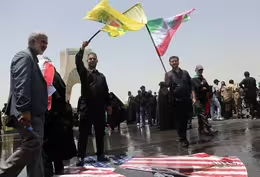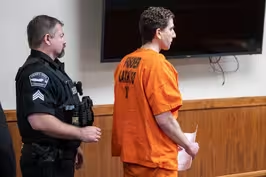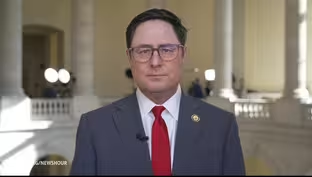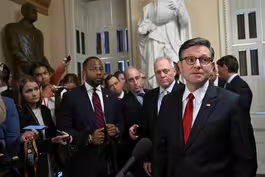
Ghana struggles to fight disease, poverty without U.S. aid
Clip: 7/2/2025 | 10m 36sVideo has Closed Captions
Ghana struggles to fight disease and poverty without vital U.S. aid
A study in The Lancet suggests that cuts to USAID could result in the death of 14 million people over the next five years. Ghana has long been seen as a beacon of democracy in West Africa, but it still struggles with poverty and serious health problems, especially in rural areas. With the support of The Pulitzer Center, William Brangham reports on what ending aid will mean for people there.
Problems playing video? | Closed Captioning Feedback
Problems playing video? | Closed Captioning Feedback
Major corporate funding for the PBS News Hour is provided by BDO, BNSF, Consumer Cellular, American Cruise Lines, and Raymond James. Funding for the PBS NewsHour Weekend is provided by...

Ghana struggles to fight disease, poverty without U.S. aid
Clip: 7/2/2025 | 10m 36sVideo has Closed Captions
A study in The Lancet suggests that cuts to USAID could result in the death of 14 million people over the next five years. Ghana has long been seen as a beacon of democracy in West Africa, but it still struggles with poverty and serious health problems, especially in rural areas. With the support of The Pulitzer Center, William Brangham reports on what ending aid will mean for people there.
Problems playing video? | Closed Captioning Feedback
How to Watch PBS News Hour
PBS News Hour is available to stream on pbs.org and the free PBS App, available on iPhone, Apple TV, Android TV, Android smartphones, Amazon Fire TV, Amazon Fire Tablet, Roku, Samsung Smart TV, and Vizio.
Providing Support for PBS.org
Learn Moreabout PBS online sponsorshipGEOFF BENNETT: We return now to our periodic look at the consequences of the Trump administration's dismantling of USAID, which was gutted earlier this year and officially closed yesterday.
As we reported, a new study in the British medical journal "The Lancet" suggests that cuts to USAID could result in the deaths of 14 million people over the next five years.
William Brangham joins us now.
So, William, yesterday, the secretary of state, Marco Rubio, he laid out a more full critique of USAID, explaining why the administration is eliminating the agency and absorbing some of its work into the State Department.
What was his core argument?
WILLIAM BRANGHAM: He reiterated what he's said before, which is that USAID was spending taxpayer money in an ineffective and wasteful way.
He said it created an NGO industrial complex, that it was creating dependency in these nations that were getting aid and not resilience.
Perhaps most strikingly, Rubio said that over the years USAID had done no real good, despite even that "Lancet" study that you just cited, it estimated that USAID has saved 90 million lives.
It's also worth remembering that, when Rubio was Senator Rubio, he was a big champion of USAID.
He argued that it was a way of expressing American values, that it short up American security.
But, in this administration, he has a different position.
Yesterday, he wrote this: "USAID has little to show since the end of the Cold War.
Development objectives have rarely been met, instability has often worsened, and anti-American sentiment has only grown."
And so he said, as of yesterday, that USAID is shuttered.
GEOFF BENNETT: And in looking at the impact of these cuts, your first report examined the effect on HIV care in one particular part of Kenya.
Your report tonight is focused on Ghana.
Why there?
WILLIAM BRANGHAM: Ghana for years has been held up as a beacon of democracy and good government in West Africa.
But it also struggles with poverty and some very serious health issues, especially in the north.
Ghana also sits in an area that is deeply troubled.
It's surrounded by Niger, Mali, Burkina Faso, nations that all have a very serious Islamic insurgency going on there.
As Senator Rubio used to argue, if USAID can shore up a nation and make sure that people don't die, that kids can go to school, those people might be resistant to Islamic insurgencies and anti-American messaging.
And this is what he used to argue, that this was part of USAID's soft power.
And so producer Molly Knight Raskin and I went to Ghana to try to give our viewers a little vignette of the kind of work that USAID used to do and what it might mean for people when it goes away.
Haruna Amina (ph) is in the early stages of labor.
She traveled hours by motorbike to get to this small clinic in the town of Tamale in Northern Ghana.
This clinic, along with hundreds like it, was supported by USAID.
Even though the care here is rudimentary, it's lifesaving.
Pregnant women in this region weren't dying nearly as often.
But now USAID's withdrawal threatens that progress.
Midwife Leticia Didera is already running short of critical medications.
LETICIA DIDERA, Midwife: USAID used to help us.
They used to -- like, the drugs for pregnant women, they were supplied.
But, these days, it's hard to come by them.
CUPID ADUMBIREH, Senior Program Manager, Jhpiego: No other donor provides as much support to the health system like USAID does.
WILLIAM BRANGHAM: Cupid Adumbireh is a senior program manager in Ghana for Jhpiego, a global nonprofit that's worked alongside USAID for five decades.
He says pregnant women here face so many challenges, and for years, the few trained medical workers were spread thin and barely had enough supplies.
CUPID ADUMBIREH: You give birth to an asphyxiated baby that cannot breathe, you just need a small Ambu bag to resuscitate the baby.
It's not available.
WILLIAM BRANGHAM: Such a simple thing.
CUPID ADUMBIREH: Such a simple thing.
And to transport babies through that hot sun for two hours, a newborn on a motorbike for two hours, you're basically killing the child before getting to the hospital.
And that's the reality we face.
WILLIAM BRANGHAM: Most of USAID's support here was to avoid tragedies like this, recently investing $70 million to expand the quality and coverage of health care, with the goal of moving Ghana closer to self-reliance.
DONALD TRUMP, President of the United States: It's been run by a bunch of radical lunatics, and we're getting them out.
WILLIAM BRANGHAM: But the Trump administration has argued that USAID's work was ineffective and corrupt, and it canceled at least 80 percent of its work here in Ghana and globally.
Ghana's newly elected President John Mahama said these cuts will fall hard on Ghana, but also warned that America's soft power influence will suffer.
JOHN MAHAMA, President of Ghana: USAID is a well-known brand of America.
And it intervenes in very critical areas.
And so if America decides that it doesn't want to intervene in those areas, it is possible that other countries might decide to fill that gap.
WILLIAM BRANGHAM: News of USAID's pullback from Ghana has spread quickly.
Local Assemblyman Abdul Fattah Oyah hears about it daily.
ABDUL FATTAH OYAH, Local Assemblyman: I was kind of, is this fake news or it's coming from an authentic source?
WILLIAM BRANGHAM: You thought it was fake news?
ABDUL FATTAH OYAH: Oh, yes,.
That was my first thought.
I sat glued to my television to listen to news.
TV says that Trump has cut aid to African countries.
I was kind of like, whoa.
WILLIAM BRANGHAM: Fattah's district relied on USAID's support for many different projects, a key one, clean water and sanitation.
Fattah says the 4,000 people in his district have just one communal working toilet.
And with waste ending up in the drinking water, disease spreads.
ABDUL FATTAH OYAH: So most of the children that mothers are bringing here full of their malnutrition and other waterborne diseases.
WILLIAM BRANGHAM: And it's not just those diseases.
Malaria, which kills more than half-a-million people in Africa every year, is endemic in Ghana and worse here in the north.
And a new breed of insecticide-resistant mosquito has spread to Ghana.
USAID funds to track it were also cut.
ADAM KAMIL, Nurse: Malaria is a very deadly disease.
WILLIAM BRANGHAM: Adam Kamil and his colleague Shuhunyi Khadija (ph) are nurses at another northern clinic struggling with USAID's withdrawal.
ADAM KAMIL: A typical example is the distribution of this bed net to pregnant women.
WILLIAM BRANGHAM: Despite State Department waivers saying that so-called lifesaving medicines and supplies are still being provided, the clinic's regular influx of malaria bed nets, vaccines and antimalarial drugs have slowed.
Kamil says a resurgence of malaria will fall hardest on mothers and children.
ADAM KAMIL: So malaria easily kills children under 5, as compared to a healthy adult person.
And if a pregnant woman also contracts malaria, her immunity during pregnancy is very compromised.
It can even cause stillbirths, low birth weights.
SHUHUNYI KHADIJA, Colleague of Adam Kamil: Anemia.
ADAM KAMIL: A whole lot -- anemia.
A whole lot of complications can set in.
ABASS ADAMA, Mother: The next time I came here, it was finished.
WILLIAM BRANGHAM: Abass Adama is one of those pregnant moms at risk.
With her young son on her back, she traveled two hours to get to a different clinic for malaria medications, but they're gone.
So when you came before, you were able to get malaria medications, but now you cannot?
ABASS ADAMA: It has finished.
Nothing.
Last time I came in, they said nothing, everything has finished here.
WILLIAM BRANGHAM: Adama says malaria has sent her son to the hospital four times already.
To the hospital?
But he's only 2 years old.
ABASS ADAMA: Yes, 2 years.
WILLIAM BRANGHAM: That's a lot for a little boy to have to deal with.
Through the course of our reporting, we have tried to talk with anyone at USAID, from Washington, D.C., to here in Ghana, and no one has been willing to go on the record and speak with us on camera.
And the State Department has prohibited anyone from speaking to the press.
Those staffers who have shared their concerns with us privately describe feelings of betrayal and anger and frustration, plus their conviction that these cuts will cost lives.
Experts who worked alongside USAID argue it not only helped tamp down malaria here in Ghana, but, more broadly, it also kept it and other infectious diseases from coming to America.
CUPID ADUMBIREH: If we are able to prevent pandemics, it's a global good.
So it's important to use your money for U.S. citizens, but it's also important to note that COVID didn't come from U.S.
It came from China, and it caused the whole world to stand still.
So, just tackling health care internally alone, it's not enough.
Any infection that you can pick from Ghana, as an American citizen, you take it back there.
WILLIAM BRANGHAM: Or a little mosquito on the plane.
CUPID ADUMBIREH: Mosquito on the plane.
Now, more than ever, it's easier to transmit disease across the globe within a day.
WILLIAM BRANGHAM: As USAID's support has withered, Assemblyman Fattah has struggled to explain what this means to his constituents.
ABDUL FATTAH OYAH: You see, it's just like breast-feeding a baby, and all of a sudden, you just wake up and decide that today you are not sucking breast milk again.
So you can imagine what would be the state of the world, the child.
So, actually, it wasn't... WILLIAM BRANGHAM: The child would be starving.
ABDUL FATTAH OYAH: Exactly.
WILLIAM BRANGHAM: Abass Adama is making the two-hour trek back home empty-handed.
She and her husband are farmers.
They sleep outside on the ground.
With the start of the rainy season and its inevitable surge of new mosquitoes, she hopes her unborn child will make it unscathed.
For the "PBS News Hour," I'm William Brangham in Northern Ghana.
Iran intensifying crackdown on dissent, Nobel laureate says
Video has Closed Captions
Clip: 7/2/2025 | 6m 5s | Iran is intensifying its crackdown on dissent, Nobel laureate Narges Mohammadi says (6m 5s)
News Wrap: Killer of 4 Idaho students pleads guilty
Video has Closed Captions
Clip: 7/2/2025 | 6m 9s | News Wrap: Killer of 4 Idaho students pleads guilty to murder (6m 9s)
Rep. Norman says Medicaid cut in bill is 'righting a wrong'
Video has Closed Captions
Clip: 7/2/2025 | 7m 56s | GOP Rep. Norman says Medicaid cut in Trump's bill is 'righting a wrong' (7m 56s)
Trump bill will get through this amid objections, Flood says
Video has Closed Captions
Clip: 7/2/2025 | 7m 1s | Rep. Flood says Trump's bill 'will get through this' amid some GOP objections in House (7m 1s)
What Paramount's Trump settlement means for press freedom
Video has Closed Captions
Clip: 7/2/2025 | 6m 5s | What Paramount's multi-million dollar settlement with Trump means for press freedom (6m 5s)
Where Trump's massive policy bill stands in the House
Video has Closed Captions
Clip: 7/2/2025 | 4m 14s | Where Trump's massive policy bill stands in the House as some Republicans express concerns (4m 14s)
Why the jury returned a mixed verdict in the 'Diddy' trial
Video has Closed Captions
Clip: 7/2/2025 | 4m 40s | Why the jury returned a mixed verdict in the trial of Sean 'Diddy' Combs (4m 40s)
Providing Support for PBS.org
Learn Moreabout PBS online sponsorshipSupport for PBS provided by:
Major corporate funding for the PBS News Hour is provided by BDO, BNSF, Consumer Cellular, American Cruise Lines, and Raymond James. Funding for the PBS NewsHour Weekend is provided by...


















